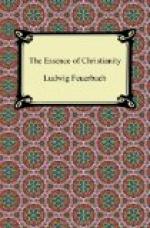|
This section contains 7,871 words (approx. 27 pages at 300 words per page) |

|
SOURCE: Massey, James A. “Feuerbach and Religious Individualism.” Journal of Religion 56, no. 4 (October 1976): 366-81.
In the following essay, Massey examines Feuerbach's theory of human mortality as delineated in his Thoughts on Death and Immortality and his critique of religion in The Essence of Christianity, maintaining that Karl Barth's influential theological refutation of Feuerbach adequately responds to the latter but not the former.
Introduction
The renewed assessment of Ludwig Feuerbach in the last three decades has resulted in a general consensus as to the content of his central religious-philosophical positions. “Man is the God of man” is the conclusion drawn from an analysis of Christian dogmas; the only real content of these dogmas is the highest hopes and aspirations of humanity. This fact, however, has remained hidden, because it is an essential property of all religious awareness unknowingly and arbitrarily to hypostatize these aspirations, to attribute to them objective...
|
This section contains 7,871 words (approx. 27 pages at 300 words per page) |

|


